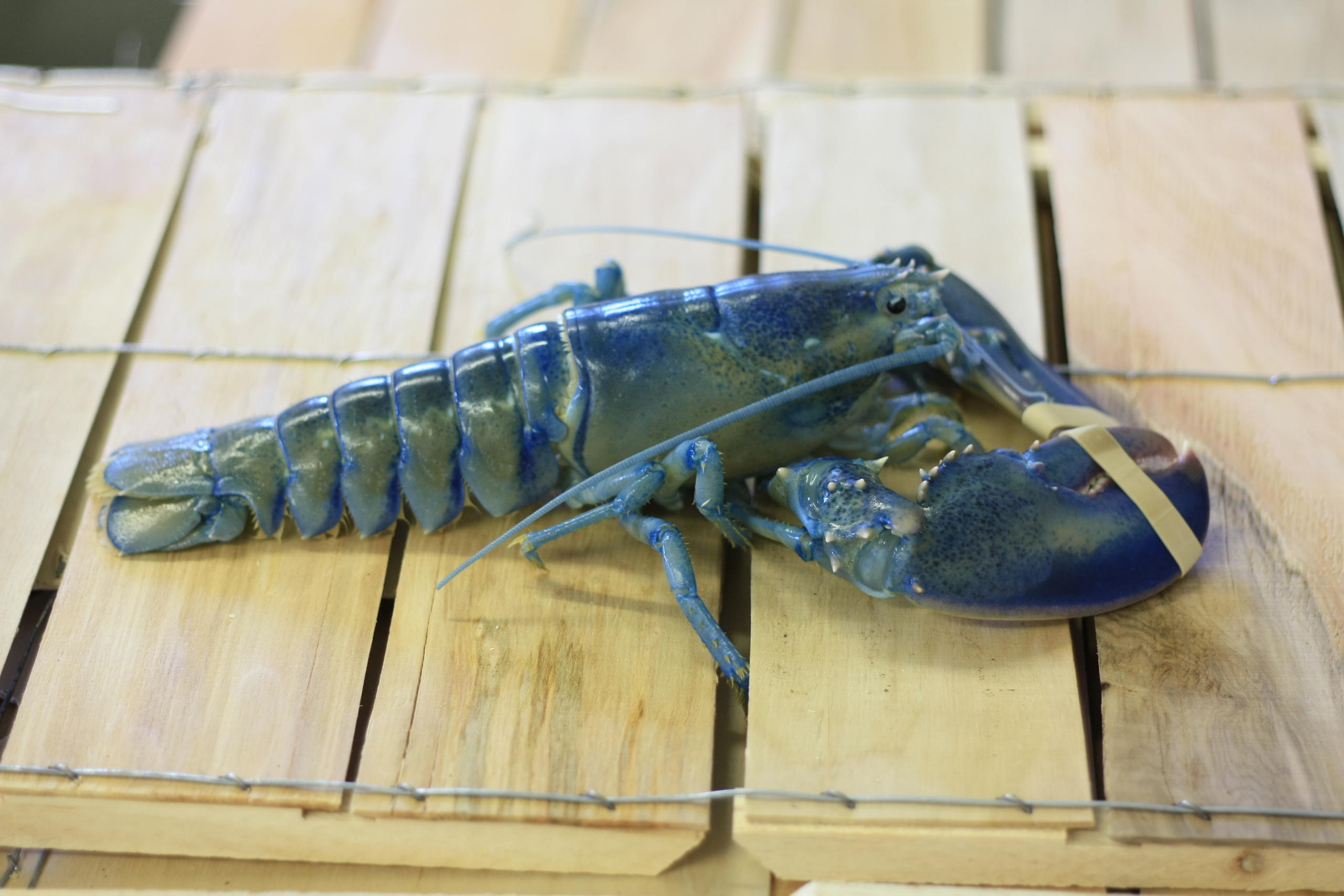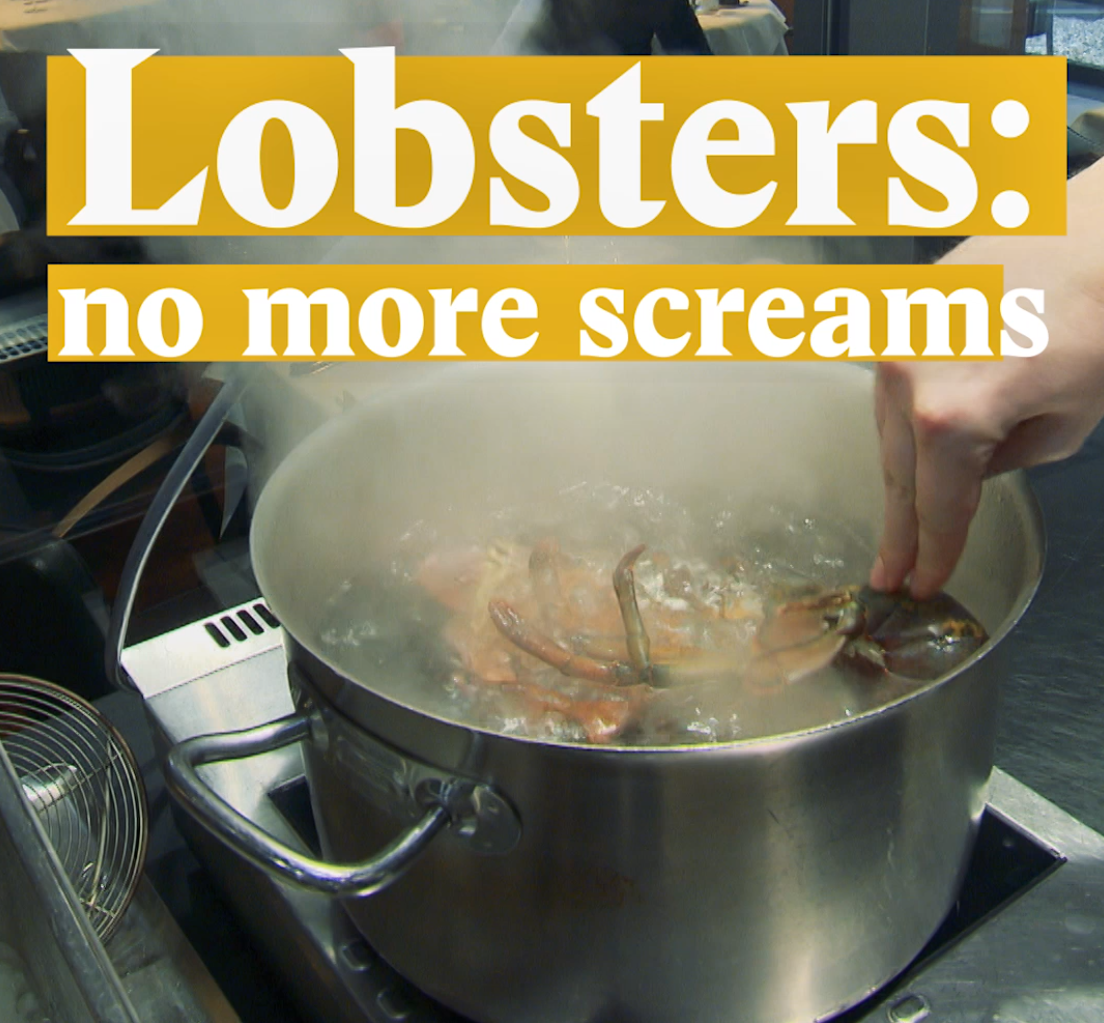
How to kill a lobster: humanely, say the Swiss

A new regulation preventing cruelty to crustaceans comes into effect in Switzerland on Thursday, banning (among other things) the live boiling of lobsters. Good news for all God’s creatures or a step too far?
The lobster sitting on the table in the Homard Bleu (Blue Lobster) restaurant near the United Nations in Geneva is, predictably, blue. It is also male – two small testes protrude from the soft underbelly – about six inches long, with deceptively small pincers that can sever a human finger. It is from Brittany, where such specimens are a speciality: smaller, bluer, tenderer, and pricier than their cousins lifted in industrial quantities from the waters of New England.
This one is also alive, though not for long. Owner Frank Jaulin, another Breton, is explaining its imminent demise. First take the “pieu”, he says (a narrow stainless-steel stake with sharp tip); locate the small cross-sectional hollow on the creature’s back, above the brain (at this point he runs his hand tenderly along the blue scales, towards an intersection point in the centre of the thorax); plunge, force, twist, retract; and the lobster is no more.
“It’s a quick death, God help us all,” wrote Samuel Beckett in the comic short story Dante and the Lobster.
Is it? Frank won’t demonstrate. For the owner and maître d’ of a seafood restaurant he is remarkably sentimental about his fare. He never kills them himself, he says; his chef does this, and he’s jealous of his kitchen’s sacrosanct privacy. And though Frank eats lobster, he claims to never eat those he has previously seen alive and swimming. He’s almost misty-eyed about it all.
No surprise, then, that he is one restaurant owner that is in favour of the regulationExternal link passed in January by the Swiss government – which comes into force today – aiming to ensure a more humane end to lobsters’ lives. The legislation, which adapts existing animal welfare law, states that at the time of entering the boiling water, lobsters must be “stunned”, and that the two ways of achieving this are electrocution or the “mechanical destruction of the brain”.

More
Public slaughter pits Swiss tradition against modern thinking
Not all restaurateurs are as happy about it. Frank’s establishment is ahead of the curve – his restaurant has always done it this way, he explains, not only for humane reasons but because their special method is grilling, which involves slicing the beast in two beforehand in any case. But others may struggle. Another feature of the regulation is that lobsters should be kept in conditions close to their natural habitat, rather than kept semi-alive in freezers; many smaller restaurants just don’t have the means to do this, says Frank (his lobsters swim in a large salinized tank behind the diners).
Another Franck, Giovannini – the 2017 Gault Millau chef of the year – complained to Swiss public radio, RTS, in January that the new rules would make life a lot more difficult. Destroying the brain by removing the head would change the character of cooking and boiling, he said; and electric shock treatment, although a possibilityExternal link, was not tried and tested. If neither method can preserve the taste and character of traditional boiled lobster, the only option might be to stock pre-cooked or pre-frozen versions. Not something he wanted to envisage.
Pain or reflex?
The lobster looks around with blank black protruding beads of eyes. What does he see? Is he even capable of suffering pain? The Swiss authorities clearly thought the proof of sentience was enough to warrant legislation. But is the ruling a humane step towards a more empathetic coexistence with animals bred or an overreach?
Opinions – and facts – are divided. Some scientific experiments based on shock treatment and future behaviour suggest that fish and crustaceans do in fact feel pain; crabs in one experimentExternal link were shown to rapidly adjust their habits to avoid areas where they had previously experienced an electric shock. Similarly, the elemental reaction of a lobster to immersion in boiling water (if you haven’t witnessed it, the creature will flail violently against the edges of the pot) also suggests that even if it is not sentient of its pain, it certainly notices something is wrong.
Others say such behaviour is a mere reflex rather than a painful experience of suffering. The Lobster Institute at the University of Maine, in the heart of New England’s fishing industry, claims that there is truth to the cliché that lobsters are simply ‘cockroaches of the sea’; “the nervous system of a lobster is very simple – not unlike that of an insect”, it writesExternal link. “Neither insects nor lobsters have brains. For an organism to perceive pain it must have a more complex nervous system. Neurophysiologists tell us that lobsters, like insects, do not process pain.”
Indeed, for a long time, lobsters were considered little more than cheap sea vermin. In French, they are sometimes called the “dustbins of the sea”. In the US, too, where it is now an expensive delicacy, for years lobsters were reportedly served in such quantity to prison inmates that at some point they had to be scaled back for fear of inhumane treatment – to the prisoners.
Ethical eating
But if the science and the mechanics of it all raise tricky economic and practical questions, when it comes to theoretical ethics the question is perhaps easier to resolve. Peter Schaber, a philosopher from the University of Zurich who specialises in animal treatment, says that he essentially agrees with the proposal, which to him is simple: “the issue is about causing pain,” he says.
He shies away somewhat from a discussion of the larger questions of dignity and creature hierarchy that have characterised the philosophy of animal treatment since the time of Immanuel Kant (who advised avoiding ill-treatment of animals on the grounds that “he who is cruel to animals becomes hard also in his dealings with men”). Schaber, himself a semi-occasional meat-eater, ultimately says that even some science is enough to cause doubt: “if it’s possible to prevent the causing of pain, then go for it.”
A sign of a larger liberal trend? Schaber is also reluctant to comment on the future of animal rights, although the long-term curve, at least in Switzerland, seems to be bending in the direction of more empathy towards more creatures. From a purely philosophical perspective, he says, “it’s difficult to justify killing animals to eat them”. For medical research, it could perhaps be argued, but for simple culinary pleasure in a world where it is increasingly easy to be vegetarian, it is a moral quandary.
Of course, how you view this future of changed attitudes and more vegetarians will depend on your own philosophy, your tastes – even your job. Giovannini, the Gault Millau chef, was not so optimistic. In the face of spawning rules and regulations aimed at animal and other welfare, he called for a step back. “There are rules about hygiene, origin, massive paperwork for all the daily arrivals of products […] We now have to mention allergies and intolerances on menus… Things were simpler thirty years ago.” he said.
For him, the complications are fast outweighing the pleasure of food. “I don’t envy the chefs fifty years from now,” he said.

More
Swiss restaurants now have to stun lobsters before cooking

In compliance with the JTI standards
More: SWI swissinfo.ch certified by the Journalism Trust Initiative


























You can find an overview of ongoing debates with our journalists here . Please join us!
If you want to start a conversation about a topic raised in this article or want to report factual errors, email us at english@swissinfo.ch.